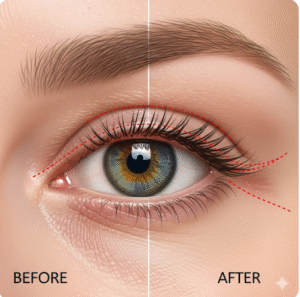Overview
Agitation refers to a state of heightened emotional arousal characterized by restlessness, irritability, or nervousness. It can manifest as physical movements such as pacing, hand-wringing, or verbal outbursts, as well as psychological distress including anxiety, anger, or frustration. Agitation is not a disease itself but often a symptom of underlying medical, neurological, or psychiatric conditions.
In South Korea, hospitals and mental health centers offer specialized care for agitation, including advanced psychiatric evaluation, medication management, and therapy programs. Early identification and treatment are crucial to prevent escalation and to ensure safety for both the patient and those around them.
Key Facts
Highlights:
➡️ Agitation can be acute or chronic and may range from mild irritability to severe behavioral disturbance.
➡️ It often accompanies conditions such as dementia, anxiety disorders, depression, delirium, or substance withdrawal.
➡️ Physical and verbal signs can include restlessness, pacing, shouting, or aggressive behavior.
➡️ Proper assessment is essential to identify underlying causes and provide targeted treatment.
➡️ Korean mental health facilities provide multidisciplinary approaches for effective management of agitation.
What is Agitation?
Agitation is a state of mental and physical restlessness often associated with heightened emotional responses. Patients may experience difficulty focusing, insomnia, irritability, and a sense of inner tension. Agitation can arise suddenly (acute) or develop gradually over time (chronic) depending on the underlying cause.
It is commonly seen in psychiatric disorders, neurological conditions such as Alzheimer’s or Parkinson’s disease, medical illnesses like infections or metabolic imbalances, and as a response to stress or trauma.
What Symptoms are Related to Agitation?
Symptoms of agitation can manifest physically, verbally, and emotionally:
- Pacing, fidgeting, or inability to sit still
- Rapid speech, shouting, or inappropriate verbal outbursts
- Irritability, anger, or frustration
- Anxiety, nervousness, or restlessness
- Sleep disturbances or insomnia
- Physical aggression or self-harming behaviors in severe cases
- Difficulty concentrating or making decisions
- Sweating, increased heart rate, or tremors associated with acute agitation
What Causes / Possible Causes of Agitation?
Highlights:
➡️ Neurological Disorders: Dementia, Alzheimer’s disease, Parkinson’s disease, stroke, or brain injury.
➡️ Psychiatric Conditions: Anxiety disorders, depression, bipolar disorder, schizophrenia, or acute psychosis.
➡️ Medical Causes: Infections, fever, metabolic disturbances, electrolyte imbalance, hypoxia, or chronic pain.
➡️ Substance Use or Withdrawal: Alcohol, stimulants, sedatives, or prescription medication withdrawal.
➡️ Environmental Stressors: Noise, overcrowding, or sudden changes in surroundings.
➡️ Sleep Deprivation: Lack of adequate sleep can exacerbate agitation and irritability.
➡️ Emotional or Psychological Stress: Trauma, grief, or unresolved emotional conflicts.
When Should I See My Doctor?
Highlights:
➡️ If agitation is sudden, severe, or out of character.
➡️ If it interferes with daily functioning, work, or relationships.
➡️ If accompanied by confusion, hallucinations, suicidal thoughts, or aggressive behavior.
➡️ If agitation persists despite lifestyle adjustments or stress management efforts.
➡️ For individuals with known psychiatric or neurological disorders experiencing worsening symptoms.
➡️ If agitation is associated with physical illness or medication changes.
Care and Treatment
Treatment of agitation depends on addressing underlying causes and managing symptoms.
Highlights:
➡️ Psychiatric Evaluation: Identifying mental health disorders and tailoring treatment plans.
➡️ Medications: Antipsychotics, mood stabilizers, or anxiolytics may be prescribed depending on the cause.
➡️ Psychotherapy: Cognitive-behavioral therapy (CBT), counseling, and stress management techniques.
➡️ Environmental Adjustments: Reducing stimuli, ensuring safety, and providing a calming environment.
➡️ Lifestyle Modifications: Adequate sleep, balanced diet, regular exercise, and relaxation practices.
➡️ Medical Management: Treating infections, metabolic imbalances, or chronic pain contributing to agitation.
➡️ Behavioral Strategies: Distraction, grounding techniques, and structured routines to reduce restlessness.
Treatment Options in Korea
South Korea provides advanced care for agitation through psychiatric, neurological, and general medical facilities.
Highlights:
➡️ Comprehensive Assessment: Multidisciplinary evaluation including psychiatric, neurological, and medical examinations.
➡️ Medication Management: Personalized prescription of antipsychotics, anxiolytics, or mood stabilizers.
➡️ Therapy Programs: CBT, mindfulness-based therapy, and stress reduction programs.
➡️ Neurological Rehabilitation: For agitation associated with dementia, stroke, or brain injury.
➡️ Supportive Care: Family counseling, caregiver education, and social support networks.
➡️ Hospital Safety Measures: Facilities equipped to safely manage patients with severe agitation or aggression.
➡️ Medical Tourism Support: Multilingual services, structured treatment packages, and follow-up care for international patients.













